The SSD Improv: Intel & Indilinx get TRIM, Kingston Brings Intel Down to $115
by Anand Lal Shimpi on November 17, 2009 7:00 PM EST- Posted in
- Storage
Overall System Performance using PCMark Vantage
Next up is PCMark Vantage, another system-wide performance suite. For those of you who aren’t familiar with PCMark Vantage, it ends up being the most real-world-like hard drive test I can come up with. It runs things like application launches, file searches, web browsing, contacts searching, video playback, photo editing and other completely mundane but real-world tasks. I’ve described the benchmark in great detail before but if you’d like to read up on what it does in particular, take a look at Futuremark’s whitepaper on the benchmark; it’s not perfect, but it’s good enough to be a member of a comprehensive storage benchmark suite. Any performance impacts here would most likely be reflected in the real world.
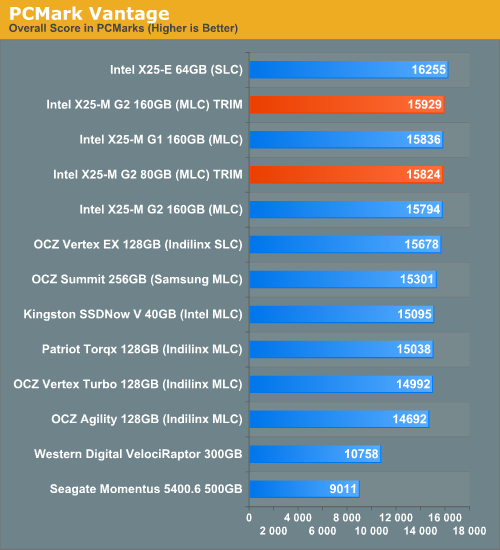
The overall impact of the TRIM firmware is negligable, no real improvements here - something you'll see echoed in nearly all of the PCMark results. The 40GB Kingston drive does well for its price, delivering performance similar to an Indilinx drive as it is crippled by a small amount of free space.
The memories suite includes a test involving importing pictures into Windows Photo Gallery and editing them, a fairly benign task that easily falls into the category of being very influenced by disk performance.
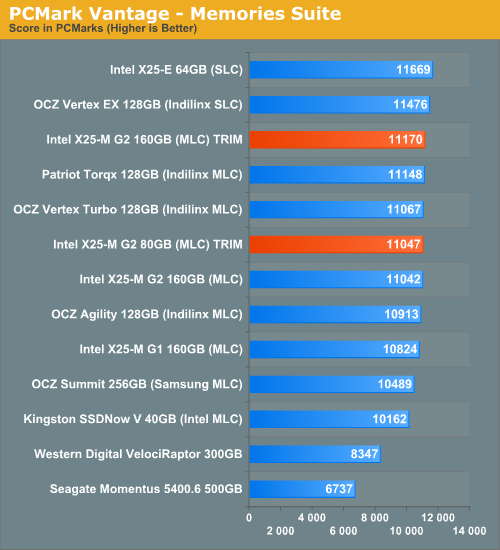
The TV and Movies tests focus on on video transcoding which is mostly CPU bound, but one of the tests involves Windows Media Center which tends to be disk bound.
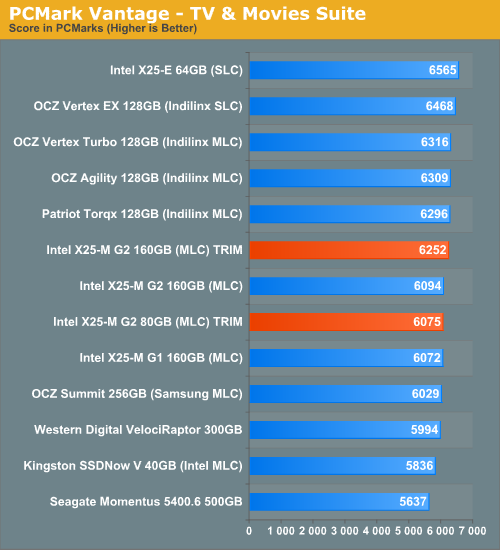
The gaming tests are very well suited to SSDs since they spend a good portion of their time focusing on reading textures and loading level data. All of the SSDs dominate here, but as you'll see later on in my gaming tests the benefits of an SSD really vary depending on the game. Take these results as a best case scenario of what can happen, not the norm.
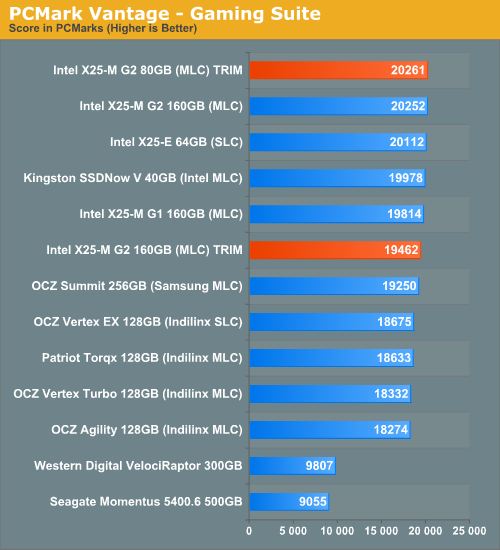
In the Music suite the main test is a multitasking scenario: the test simulates surfing the web in IE7, transcoding an audio file and adding music to Windows Media Player (the most disk intensive portion of the test).
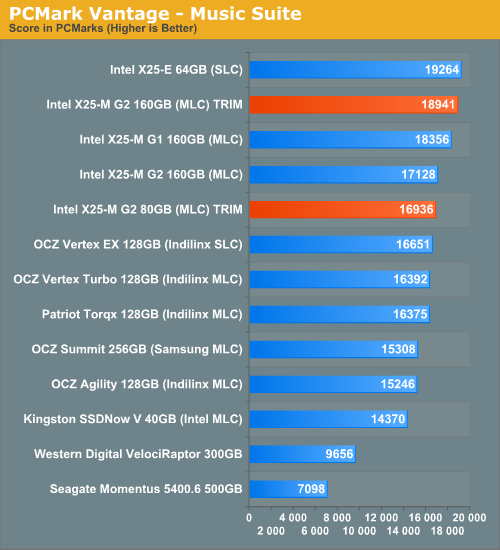
The Communications suite is made up of two tests, both involving light multitasking. The first test simulates data encryption/decryption while running message rules in Windows Mail. The second test simulates web surfing (including opening/closing tabs) in IE7, data decryption and running Windows Defender.
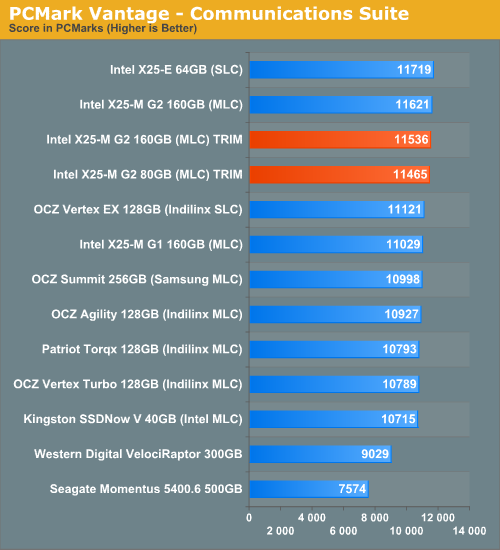
I love PCMark's Productivity test; in this test there are four tasks going on at once, searching through Windows contacts, searching through Windows Mail, browsing multiple webpages in IE7 and loading applications. This is as real world of a scenario as you get and it happens to be representative of one of the most frustrating HDD usage models - trying to do multiple things at once. There's nothing more annoying than trying to launch a simple application while you're doing other things in the background and have the load take forever.
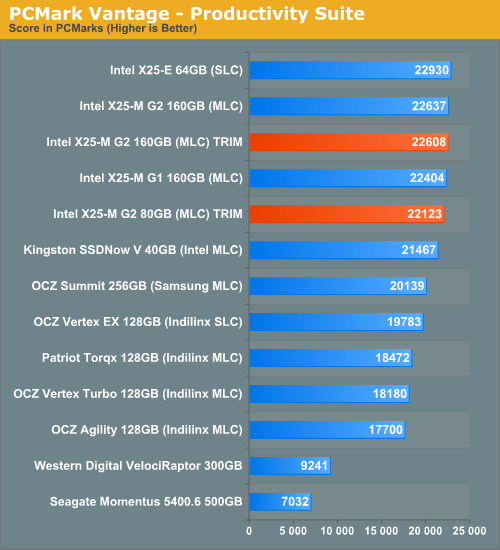
The final PCMark Vantage suite is HDD specific and this is where you'll see the biggest differences between the drives:
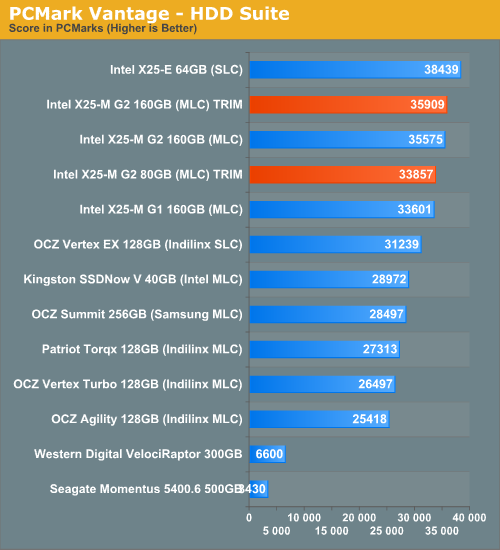










162 Comments
View All Comments
The0ne - Monday, October 26, 2009 - link
No kidding. Early adopters really shouldn't complain, that's what you get for being the "elite." LMAO.As I've said before, just wait til early next to summer and the tech will be more mature. Yea, go ahead and make your argument that you can wait til next year but by then they'll be new products. That's cool...but I think ppl saying this have no clue about what's really happening around the technology.
Regardless, sounds nice to be saying it so woohooo be the first!
klil - Monday, October 26, 2009 - link
I dont think that you should lose the wiper and trim support for being an early adapter, it does not make senseThe only early adapter lesson i know of was that one from a intel processor that had a bug... pentiums from 1994: http://en.wikipedia.org/wiki/Pentium_FDIV_bug">http://en.wikipedia.org/wiki/Pentium_FDIV_bug
If they were not able to put it in due to hardware problems its one thing... but those drives cost 665 dollars in the beggining. I bet that if you had one you would not be happy :|
pcfxer - Tuesday, October 27, 2009 - link
ADOPTER, A-D-O-P-T-E-R.I can't even fathom how you could read what someone posts, "early adopter this....early adopter thaaat" and you go and type ADAPTER.
Adapter -> Adaptation between two or more objects.
Did you not have coffee yet man?
chizow - Monday, October 26, 2009 - link
Agreed, Intel will certainly meet more resistance in the future for their emergent technologies and undoubtedly lost the support of many of their most dedicated supporters with this decision.If there were some technical reason or incompatibility behind the lack of TRIM support on G1 that'd be one thing, but from what has been published by AT and others, its nothing more than indifference on Intel's part preventing support.
Blur - Tuesday, October 27, 2009 - link
Eloquently stated, i bought two of the G1 drives. I won't be suckered into supporting any of intels new tech early again and I'll be taking a much closer look at their competitors products when purchasing more established tech.Zingam - Monday, October 26, 2009 - link
Is there a change that a newer better technology will replace Flash so that we can finally have real SSDs at affordable prices?Zingam - Wednesday, October 28, 2009 - link
Sorry about the spelling/grammar errors above!therealnickdanger - Monday, October 26, 2009 - link
Intel was working on some sort of phase-change technology, not sure where it is now. Probably still too expensive for mainstream:http://www.dailytech.com/searchresults.aspx?keywor...">http://www.dailytech.com/searchresults.aspx?keywor...
MS - Monday, October 26, 2009 - link
Nanochip went belly-up and the IP was auctioned off. Ovonyx turned into Numonyx and PCM is still an emerging alternative to other technologies. The biggest issues relate to the limitatios in process technology, i.e, at about 20 nm geometry, the required write currents are expected to actually melt the metal interconnects. There are other technologies such as resistive memory as developed by 4-d-s and organic memories such as the ones from Zettacore that may become very attractive.Souka - Monday, October 26, 2009 - link
phase-change technology?Sounds like vapor-ware to me! :)